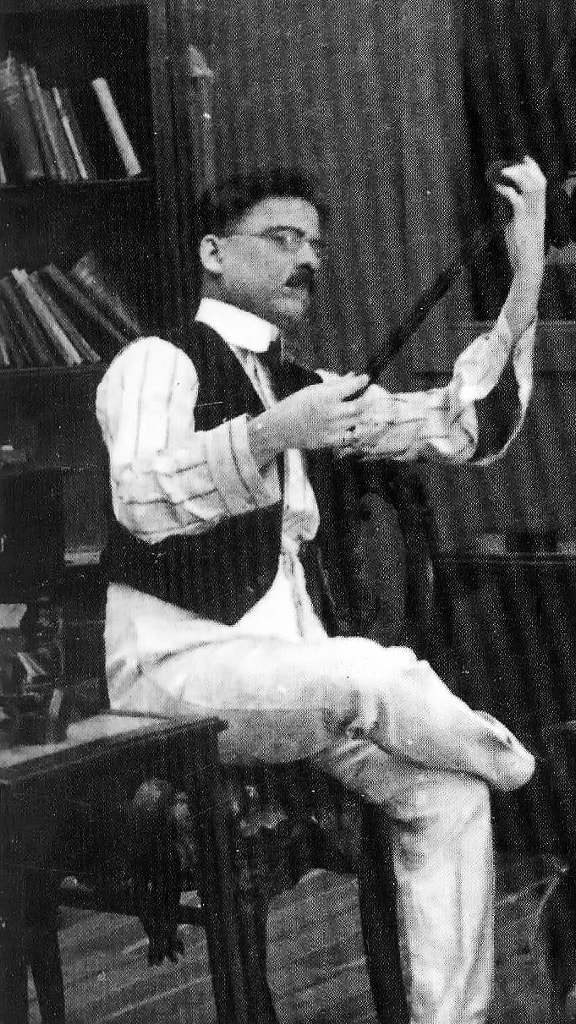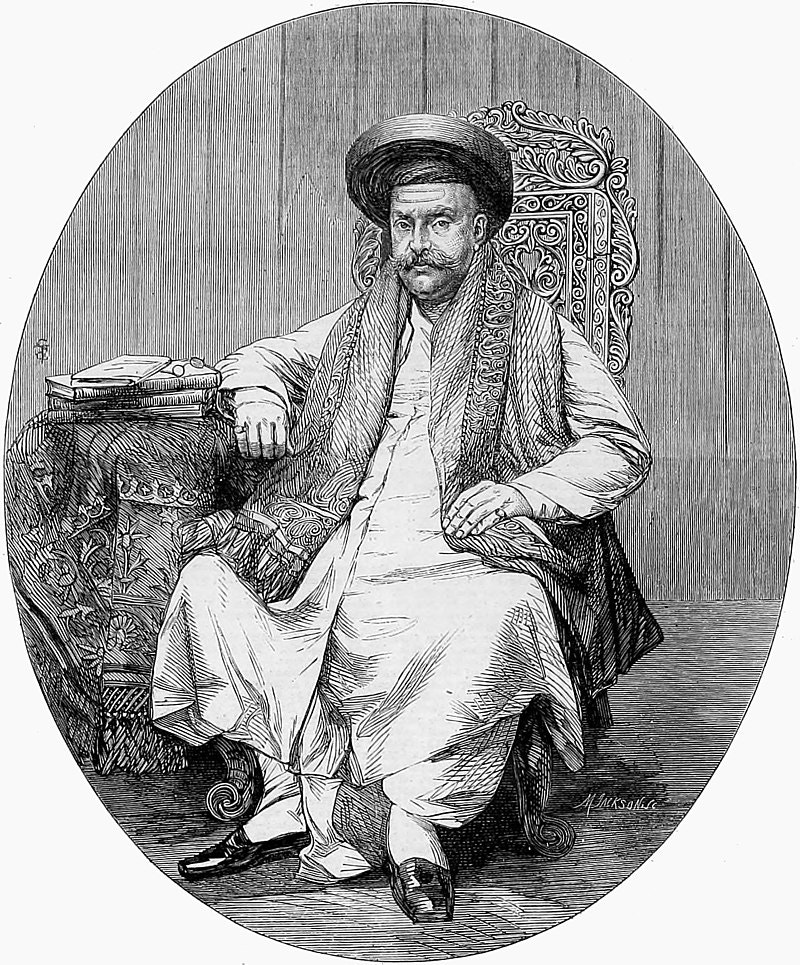|
Dadasaheb Phalke
|
Nana Shankarsheth
|
Many entrepreneurs, while opinionated about business issues, often tend to be apolitical or at least try to steer clear of making public their political leanings to prevent negative impact on their business interests. Some, of course, are fanatics, who also use their monetary success to defend and further their political interests. Some others are fanatic enough to declare the entire political class as useless and corrupt.
Nevertheless, for times immemorial, entrepreneurs have pugmarked the path of technological and social progress, albeit to further their business interests in the short term, but resulting in ultimate progress of society towards being more fair and equanimous. Some entrepreneurs who played a pivotal role in India's freedom struggle include G.D. Birla whose association with M.K. Gandhi is well known and his struggles against British & Scottish traders and his efforts to set up indigenous industry are well documented. There were other 'swadeshi' businessmen such as Ardeshir Godrej and Ramnath Goenka who in their own ways supported the growth of local businesses in India.
If you trace the strength of the final Indian Independence movement - the one led by Gandhi, Nehru, Patel, Bose and other leaders - it was in the fact that it had a national appeal. Unlike 1857, when the British were able to defeat local rebellions in isolated skirmishes, in 1940s the freedom struggle was spontaneously nationwide. This nationally 'integrated' rebellion was a result of India having transformed itself from being a collection of princely states (as it was in 1857) into one nation. There were many reasons for such transformation - but two forces which played a major role in this were Railways and Cinema.
Indian Railways led to massive intermingling of populations across the length and breadth of the country; also since people could move they could assemble to one city by travelling from across the country creating the possibility of large gatherings that would be impossible for local administration of one city to dissipate or thwart. Of course, Gandhi's non-violent methods made it even difficult to stop such gatherings on legal grounds because no 'crime' was being conducted.
Cinema acted in two ways - one it helped people watch and "vicariously" experience cultures from other parts of the country; it helped the different 'communities' in India realise they weren't as different really as they earlier thought they were. They spoke different languages but had similar value systems, similar social issues, similar problems. In fact, as Cinema (especially Hindi Cinema which is now called Bollywood) spread, it created a common 'national culture' which acted like an umbrella over sub-national identities of Indians. Second, Cinema acted like a conscience awakener of the masses - as this Quora answer says:
The conjecture which I want to present is that both these elements - Railways and Movies weren't a result of any well thought out plan to 'awaken' the nation or get it independence but simply the hustle typical of entrepreneurs. It is well known that Movies came to India due to the efforts of Dadasaheb Phalke - the movie Harishchandrachi Factory - beautifully captures his journey as a typical slightly eccentric entrepreneur who is just mad about Cinema and bringing it to India.
Less is known about the fact that Railways were also a similar effort by an Indian financier Nana Shankarsheth who used to finance British and Indian traders. Shankarsheth was known for developmental works, but his main contribution was the formation of the Indian Railway Association which lobbied for and finally succeeded in getting Railways to India in the early days of Railway development in the world. It was his idea and efforts to start Railways in India according to which he had discussed the proposals with British Govt of that time. Eventually, the association was incorporated into the Great Indian Peninsula Railway, and Sir Jamsetjee Jeejeebhoy and Shankarsheth became the only two Indians among the ten directors of the GIP railways.
My ratiocination is that entrepreneurs are important for a society - even though they often don't directly participate in political awakening but they are the change-makers, the square pegs in the round holes who create tools and sometimes conditions which finally lead to changes that they themselves never imagined of!
Nevertheless, for times immemorial, entrepreneurs have pugmarked the path of technological and social progress, albeit to further their business interests in the short term, but resulting in ultimate progress of society towards being more fair and equanimous. Some entrepreneurs who played a pivotal role in India's freedom struggle include G.D. Birla whose association with M.K. Gandhi is well known and his struggles against British & Scottish traders and his efforts to set up indigenous industry are well documented. There were other 'swadeshi' businessmen such as Ardeshir Godrej and Ramnath Goenka who in their own ways supported the growth of local businesses in India.
If you trace the strength of the final Indian Independence movement - the one led by Gandhi, Nehru, Patel, Bose and other leaders - it was in the fact that it had a national appeal. Unlike 1857, when the British were able to defeat local rebellions in isolated skirmishes, in 1940s the freedom struggle was spontaneously nationwide. This nationally 'integrated' rebellion was a result of India having transformed itself from being a collection of princely states (as it was in 1857) into one nation. There were many reasons for such transformation - but two forces which played a major role in this were Railways and Cinema.
Indian Railways led to massive intermingling of populations across the length and breadth of the country; also since people could move they could assemble to one city by travelling from across the country creating the possibility of large gatherings that would be impossible for local administration of one city to dissipate or thwart. Of course, Gandhi's non-violent methods made it even difficult to stop such gatherings on legal grounds because no 'crime' was being conducted.
Cinema acted in two ways - one it helped people watch and "vicariously" experience cultures from other parts of the country; it helped the different 'communities' in India realise they weren't as different really as they earlier thought they were. They spoke different languages but had similar value systems, similar social issues, similar problems. In fact, as Cinema (especially Hindi Cinema which is now called Bollywood) spread, it created a common 'national culture' which acted like an umbrella over sub-national identities of Indians. Second, Cinema acted like a conscience awakener of the masses - as this Quora answer says:
Indian film industry (including regional films) before Independence explored a lot of social, moral, cultural, devotional, mythological themes, but refrained from an overt anti-British, pro-independence presentation. For obvious reasons.Movies created a mass sentiment in support of the freedom struggle, by profiling historical stories gave Indians reasons to feel pride in their nation prior to British Raj and finally, progressive themes also created conditions for Indians to aspire for modern values - independence and self-governance being two of them. Just like Twitter played a role in Arab Spring and other movements across the globe today, Cinema played a role in the Indian Independence movement.
However, they sometimes tactfully inserted the voice of the freedom seeking Indians in a manner which can escape the scrutinising eyes of the British sensor. The author mentions the song 'Door Hato O Duniyawalon Hindustan Hamara hay' from the movie Kismet (1943) as an example.
The conjecture which I want to present is that both these elements - Railways and Movies weren't a result of any well thought out plan to 'awaken' the nation or get it independence but simply the hustle typical of entrepreneurs. It is well known that Movies came to India due to the efforts of Dadasaheb Phalke - the movie Harishchandrachi Factory - beautifully captures his journey as a typical slightly eccentric entrepreneur who is just mad about Cinema and bringing it to India.
Less is known about the fact that Railways were also a similar effort by an Indian financier Nana Shankarsheth who used to finance British and Indian traders. Shankarsheth was known for developmental works, but his main contribution was the formation of the Indian Railway Association which lobbied for and finally succeeded in getting Railways to India in the early days of Railway development in the world. It was his idea and efforts to start Railways in India according to which he had discussed the proposals with British Govt of that time. Eventually, the association was incorporated into the Great Indian Peninsula Railway, and Sir Jamsetjee Jeejeebhoy and Shankarsheth became the only two Indians among the ten directors of the GIP railways.
My ratiocination is that entrepreneurs are important for a society - even though they often don't directly participate in political awakening but they are the change-makers, the square pegs in the round holes who create tools and sometimes conditions which finally lead to changes that they themselves never imagined of!


Comments
Post a Comment